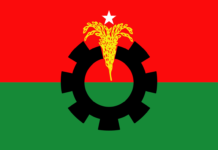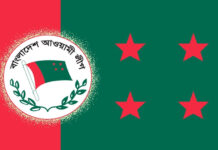Bangladesh Nationalist Party acting secretary general Mirza Fakhrul Islam Alamgir on Saturday sharply reacted to the remarks of Sajeeb Wajed Joy, son of prime minister Sheikh Hasina, that BNP founder Ziaur Rahman could in no way be a freedom fighter. ‘Joy is a leader of young generation. What should I tell him? I do not want to reply personally to what he said but I would like to tell him not to talk like an imbecile,’ he told a discussion at the National Press Club. Fakhrul said, ‘The new generation would not accept you [Sajeeb] if you continue talking like Awami League leaders.’ Sajeeb, at discussion in the capital on Friday, said: ‘How can Ziaur Rahman be a freedom fighter? He can in no way be a freedom fighter.’ ‘Making indecent remarks on Zia is tantamount to denial of Bangladesh,’ Fakhrul said, claiming that Sajeeb had no ‘stake’ in Bangladesh. Defending his contention, he said, ‘Joy was born in 1971 in the custody of the Pakistani army. He spent most of his childhood in India and now lives in the USA. He has no stake in Bangladesh.’ Fakhrul said the party banner – Awami League – under which Joy was doing politics, was a gift offered by Zia after the party had disappeared through the formation of BKSAL. ‘You [Sajeeb] say BNP was given birth to in an autocratic manner. Look at your face in the mirror before calling BNP a byproduct of autocracy,’ Fakhrul said. The BNP leader wanted a government clarification about Latif Siddique’s reported remarks that Sajeeb received $ 2 lakh each month from the government funds. ‘We want to know whether Latif Siddique was removed from the cabinet for his comments on hajj or on Joy’, Fakhrul asked. He said he thanked the prime minister’s adviser HT Imam for ‘revealing’ the government ‘blueprint’ over the January 5 elections. HT Imam, speaking at a function of Chhatra League at Dhaka University Teacher-Student Centre on Wednesday, said: ‘Police and civil administration stayed by our side during the January 5 elections… I communicated with each upazila [officials]… We conducted the elections coordinating with our recruited officials who belonged to us…. The mobile courts for the elections were run by our officials, they stayed by our side… They showed courage on our behalf.’
Source: New Age









